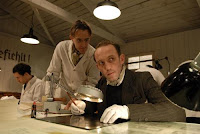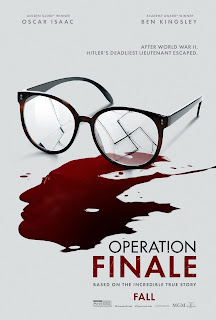The Counterfeiters

Die Falscher (The Counterfeiters), the recent Oscar winner for best foreign film, asks many questions in its hour and forty minute running time, and inspires discussion upon viewing.
In what Steve Ritter calls "a good movie," a group of artistic Jews led by Sally Sorowitsch are removed from their respective concentration camps and taken to the Sachsenhausen concentration camp to work in a shop dedicated to the forgery of foreign currency. As the war winds down and Germany lacks funds, they are on a race to copy the American dollar so that Germany can help finance its war effort against the Allies.
While others in the camp die around them, the counterfeiters are given regular meals, soft beds, music and treated relatively well. Is their participation in aiding Germany in the war justifiable in order to save themselves from torture and death by gunshot or gassing? One of the counterfeiters doesn't think so, and puts his colleagues at risk when he elects to sabotage the counterfeiting efforts, against the wishes of the others.
The Counterfeiters is not about the horrors of a concentration camp; such horrors are there, but on the periphery of this story. The Counterfeiters is a morality tale that pits its characters' faith and heritage against that of their state, and asks the question, can one justify evil in order to save oneself? To save another? Or to save a few while allowing the many to die?
After viewing this film we found ourselves asking each other, who was wrong and who was right? And why?
***1/2 out of 5



Comments